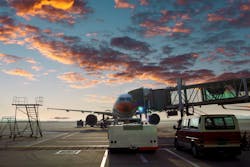FARNBOROUGH, U.K. - Record temperatures at the Farnborough Airshow this week have ratcheted up pressure on global aviation to shrink airplane emissions and turn a raft of potential solutions - many of which are yet to be proven - into reality, David Shepardson and Paul Sandle write for Reuters. Continue reading original article.
The Military & Aerospace Electronics take:
25 July 2022 - The airline industry contributes about 3% of global carbon emissions and has vowed to be "net zero" by mid-century. With temperatures going above 40 degrees Celcius (104F) for the first time since temps were recorded, the Reuters writers note the heatwave was acting as a stark reminder that global climate change is a problem that needs to be addressed
"I consider there is urgency, speed is of the essence in the transition," Airbus CEO Guillaume Faury told Reuters. "And in an industry that is hard to abate...we need to be moving fast."
One near-term solution being offered by the aerospace and fuel industry is dubbed "sustainable aviation fuel," which is made from plants rather than refined kerosene.
Hydrogen fuel cells are a long-term solution according to Eric Schulz, who is a former executive at Rolls-Royce and Airbus, and currently is the CEO of SHZ Consulting. In addition, airlines and Airbus have signed letters of intent to purchase removal credits from a Texas-based carbon capture and storage facility.
Related: Air travel emissions are high, and only getting worse
Related: A4A applauds ICAO aircraft emissions standards decisions
Related: In-flight 100% sustainable-fuels emissions study of passenger jet shows early promise
Jamie Whitney, Associate Editor
Intelligent Aerospace

